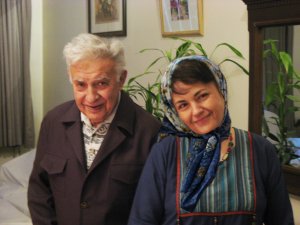During the last week of December, 3 men were stoned to death in Behesht Reza Cemetery in Mashhad for the crime of adultery. One of them, an Afghan citizen by the name of Mahmoud, managed to forcibly escape from the stoning pit and survived. Unfortunately, the other two men, one of whom is named Hushang Khodadaeh and another who remains unidentified, were killed, pounded mercilessly with stones. This is the latest such case since the stoning deaths of Jafar Kiani in June 2007, and Mahboubeh M and Abbas H in May 2006.
For the last three years ago, the Head of the Iranian Judiciary has repeatedly stated that although the punishment of stoning remained under Iranian law, the execution of such sentences were not enforced; at the same time, a moratorium on stoning has been in effect for the entire country Nevertheless, we have witnessed at least 6 cases of stoning in the last 3 years. Clearly, as long as the penalty of stoning remains under the Penal Code and sanctioned by Iranian law, such words by the Head of the Judiciary are worthless.
In July of this year, several women’s rights defenders, lawyers, and activist held a rpess conference announcing the names of nine women who were currently awaiting stoning sentences. Since then, spokesman for the Judiciary Alireza Jamshidi announced in August that the stoning sentences of four women (Layla G., Azar and Zohreh Kabiri, and Shomameh Malak Gharbani) would be commuted to whipping and imprisonment. However, Azar and Zohreh Kabiri has not been released yet and a retrial planned for January 12 which will judge whether they are guilty for adultery or not.
In addition, there are presently at least ten others locked up in several prisons around the country who are in danger of being stoned to death:
-1. Kobra Najjar, imprisoned in Reja’i-shahr- Karaj
-2. Iran A., imprisoned in Sepidar Prison- Ahvaz
-3. Kheirieh V., imprisoned in Sepidar Prison- Ahvaz
-4. Ashraf Kalhori, imprisoned in Evin Prison-Tehran
-5. Abdollah Farivar, imprisoned -Sari Prison
-6. Ghilan Mohammadi, imprisoned in Central Prison -Isfahan
-7. Gholamali Eskendari, imprisoned in Central Prison – Isfahan
-8. Afsaneh R., imprisoned in In ‘Adel Abad Prison -Shiraz
-9. The woman M.J., imprisoned in Vakil Abad Prison – Mashhad
-10. The woman H. Imprisoned in Vakil Abad Prison – Mashhad
Furthermore, the Majlis, or Iranian Parliament, is currently reviewing a new draft of the Islamic Penal Code. In it, the punishment for adultery is, once again, stoning. The only difference in this new act from the current law is that “based on the prosecutor’s discretion, if the implementation of penal measure such as stoning causes mafsadeh [degradation and disgrace], he can submit a revision and request an alternative measure such as lashing or execution to the Head of Judiciary.”
However, many women’s rights defenders, including the Stop Stoning Forever Campaign, are deeply troubled the revised law. Most notably, the penalty of stoning has not been omitted. In addition, implementation of such a verdict has been left to the discretion of the local prosecutor, who may decide to carry out the verdict or ask for alternative action to be taken, and who can base his judgment on his personal beliefs even if he may be considered a religious fundamentalist.
The Stop Stoning Forever Campaign was formed in August 2006 after news spread of the stoning of two people in Mashhad and the sentencing of Ashref Kalhari to stoning in Evin Prison. Its goal is to eliminating stoning unequivocally from the Iranian Penal Code. Since it began work, the Campaign, working predominately with the Network of Volunteer Lawyers, has saved eight women and one man: Hajieh Esmaeilvand, Parisa A., Najaf A., Soghra Molaei, Zahra Rezaei, Mokarrameh Ebhrahimi, Shamameh (Malek) Ghorbani, Azar Kabiri, Zohreh Kabiri, and Layla G. from death by stoning. In addition, the stoning sentence of one woman, Ashref Kalhari, has been suspended.
Even in light of these successes, the Stop Stoning Forever Campaign has grown deeply troubled by instances of stoning and the increasing number of executions that we have witnessed in Iran in the last few months due to extremist government policies and judicial trends. We urge the public to continue to register their protest with the inhumane punishment of stoning and to demand to the authorities of the Islamic Republic that they terminate this punishment once and for all.

